How to: Choose the Best Countertop for Your Kitchen
When you choose a countertop for your kitchen, there are several factors to consider beyond looks. Durability, maintenance, and cost are all important factors that can impact your decision. Countertops play a big role in the overall look and feel of your space, so it’s important to choose a kitchen countertop wisely. But with so many different materials and styles to choose from, how do you know what’s right for you? Here’s a quick guide to help you choose the best countertop for your kitchen.
Functionality
One of the most important things to consider when choosing countertops is functionality. Depending on how you use your kitchen, some materials may be better suited than others. For instance, if you do a lot of cooking and entertaining, durability and heat resistance should be at the top of your list. Conversely, if you don’t do much cooking or entertaining, you may be more concerned with aesthetics than durability.
Maintenance
Another important thing to consider is maintenance. Some materials require more upkeep than others. Think about how much time and effort you’re willing to put into maintaining your countertops before making your final decision. Kitchen countertops come in a wide range of materials, each with its own set of pros and cons.
Pros and Cons of Different Materials

Marble
Marble is a natural stone that has been used for centuries in everything from sculptures to buildings to countertops. It’s unique veining and color patterns make it a popular choice for many homeowners looking to add a touch of luxury to their homes. But marble isn’t without its drawbacks.
Pros:
- Marble is a durable material that can last for generations with proper care.
- It is heat resistant.
- Marble is unique and no two pieces are exactly alike.
- Marble adds value to your home.
Cons:
- Marble is a porous material and can stain easily.
- It requires regular maintenance and care.
- It’s a soft stone that can be easily scratched.
- Marble is one of the more expensive countertop materials.
Quartz
Quartz countertops are made from engineered stone, which is a mix of natural quartz and other materials.
Pros:
- Quartz is extremely durable and resist scratches, chipping, and staining.
- Non-porous material won’t absorb spills or stains.
- Quartz countertops are available in a wide variety of colors and patterns, so you can find an option to suit your style.
Cons:
- They are one of the more expensive countertop materials.
- They require regular sealing to keep them looking their best.
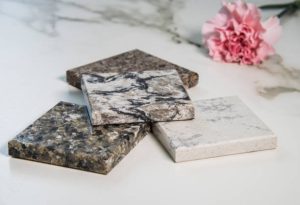
Granite
Starting life as a quarried piece of natural stone straight from the earth, granite countertops are then cut and polished to meet your specific kitchen needs. Professional installation crews will deliver and install your new countertop so that you can enjoy its beauty for years to come.
Pros:
- Granite is a durable material that can withstand years of use.
- It’s heat resistant, so you can place hot pans directly on the countertop without fear of damage.
- Granite is also scratch resistant, making it a good choice for high-traffic kitchens.
- The natural beauty of granite add value and elegance to your kitchen.
Cons:
- Granite countertops can be expensive, depending on the type of granite you choose.
- It’s a porous material, so it needs to be sealed periodically to prevent staining.
- Granite is also susceptible to chipping, so it’s important to take care when using sharp knives or other objects on the countertop.
Laminate
A laminate countertop is created when a thin layer of plastic laminate material is adhered to a core made from either particleboard or MDF (medium-density fiberboard). Many companies make laminates, including Formica and Wilsonart, with hundreds of color and style options available.
Pros:
- Laminate countertops are less expensive than other materials like granite or marble.
- It is easy to clean and maintain. Simply wipe down with a damp cloth or sponge.
- Available in a wide variety of colors and patterns, so you can find the perfect look for your kitchen.
- Laminate is more resistant to heat.
Cons:
- Laminate countertops can be scratched or damaged more easily than other materials.
- These countertops may not last as long as other materials.
- Some people feel that laminate does not have the same luxurious look as materials like granite or marble.
Ceramic Tiles
Ceramic tile counters are constructed from clay-based tiles that are affixed to a cement-board core using thin-set adhesives. Tile grout lines make it an undesirable countertop material in kitchens, but larger ceramic and porcelain tiles may be used to reduce the amount of seams and make maintenance easier.
Pros:
- It is resistant to heat, scratches, and stains. With proper care, a ceramic tile countertop can last for many years.
- Ceramic tile is non-porous, so it resists bacteria and stains. spills can be easily wiped away, and the countertop can be easily sanitized.
- It requires little maintenance. It does not need to be sealed or waxed, and it is resistant to most household cleaners.
Cons:
- The cost will vary depending on the type of tile you select and the size of your kitchen.
- Although ceramic tile is durable, it is also susceptible to breakage. If it is not properly installed or cared for, it can crack or chip.
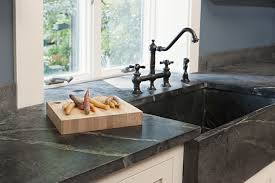 Soapstone
Soapstone
Soapstone is a natural stone that has been used for centuries in many different ways. It is most commonly found as metamorphic rock, and consists of the mineral talc. Soapstone gets its name from its slippery feel when wet – like soap! But it is also known for being very durable and heat resistant, making it an ideal material for countertops or any other kitchen surface where those properties would come in handy.
Pros:
- Soapstone is a very durable material that can withstand high temperatures. This makes it ideal for use in areas like countertops where hot pots and pans may be placed.
- It is also resistant to stains and scratches, making it a low-maintenance option for kitchen surfaces.
- The natural color of soapstone is a dark gray or black, which can complement other kitchen finishes well.
- Soapstone is a non-porous material, so it does not need to be sealed like other countertop materials.
Cons:
- Soapstone is a soft stone, so it can be scratched or chipped more easily than harder materials like granite.
- Because it is a natural material, each piece will have unique markings and variations in color. This means that it may be difficult to find two pieces that match exactly.
- Soapstone is rather expensive, sometimes costing more than granite.
- Only limited colors available.
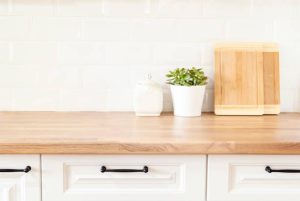
Wood
One popular option for a kitchen countertop is wood. Wood countertops can give your kitchen a warm, natural look. If you want to go the extra mile with green remodeling, install a reclaimed wood counter. Old barns, floors, walls, and counters are turned into new ones for an upscale antique look. To find these raw materials, check architectural salvage yards.
Pros:
- Wood countertop creates a warm, natural look.
- It can be stained or sealed to match your kitchen’s décor.
- Wood is durable and long-lasting.
Cons:
- Wood requires regular maintenance, like sealing or oiling.
- It can easily be damaged by heat or water.
- It may not be ideal for heavy use kitchens.
Cost
Of course, cost is always a factor when choosing anything for your home. When it comes to countertops, there is a wide range in pricing depending on the material. Generally speaking, natural stone like granite or marble will be on the higher end while synthetic materials like laminate will be on the lower end; however, there are always exceptions to the rule.
There are a lot of factors to consider when you have to choose a countertop for your kitchen. But if you keep functionality, maintenance, and cost in mind, you’re sure to find an option that’s perfect for your space. So, what’s the best countertop for your kitchen? It really depends on your needs and preferences. If you’re not sure where to start, Anve Kitchen and Bath can help. We offer kitchen design services that will take into account your budget, lifestyle, and aesthetic preferences. We’ll work with you to find the perfect countertop material and style for your home. Contact us today to get started!
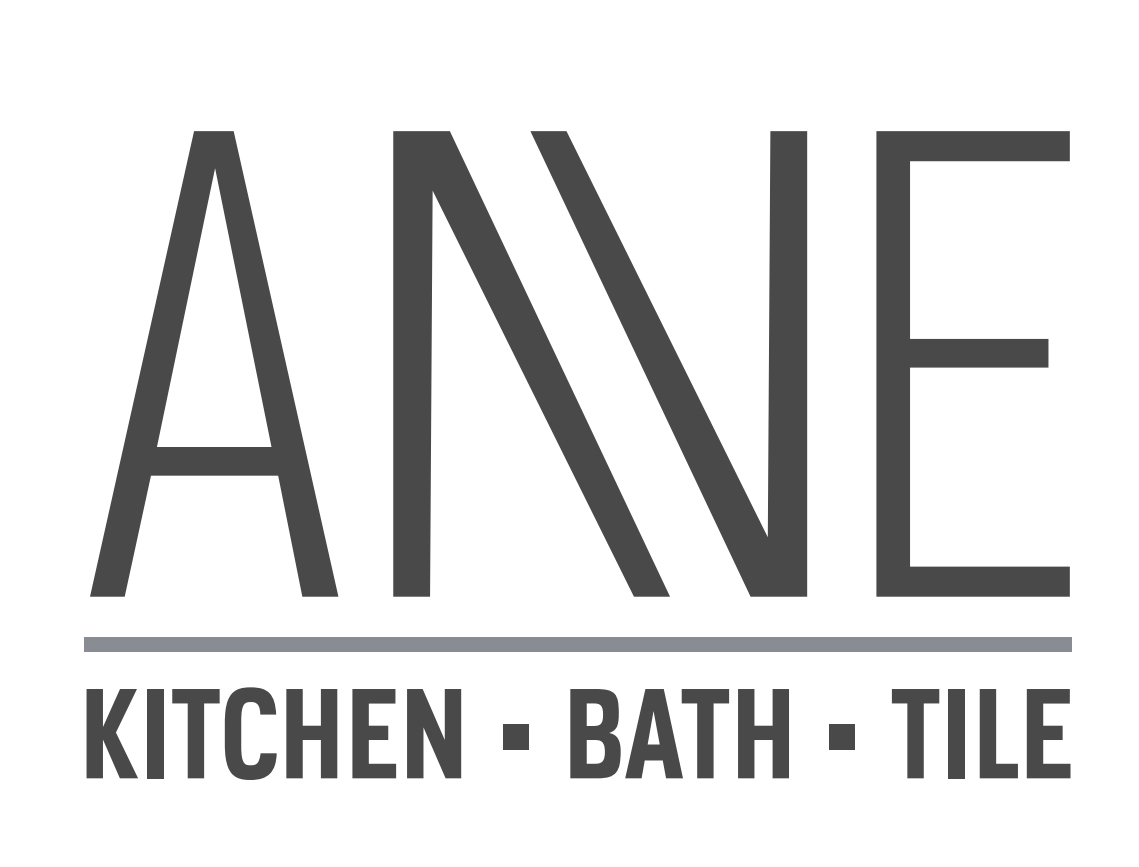
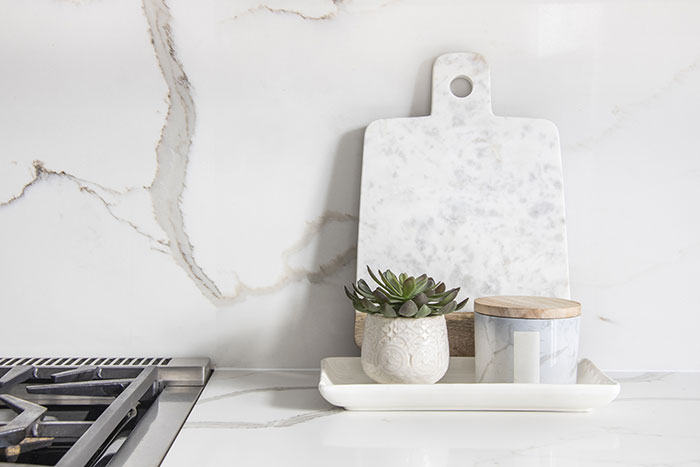
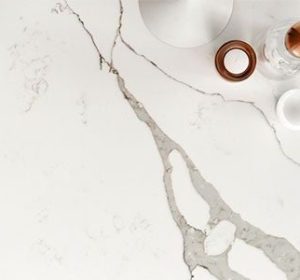
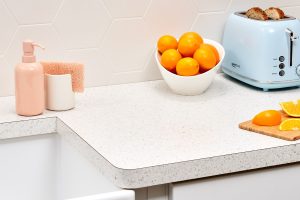
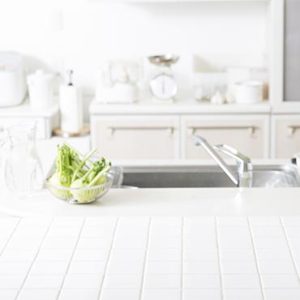


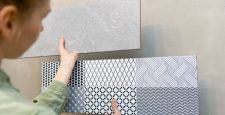
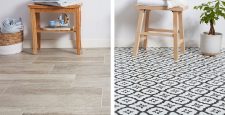
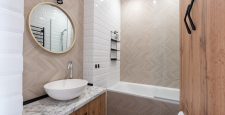





Comment (1)
[…] more on “How to: Choose the Best Countertop for Your Kitchen,” on our […]
Comments are closed.